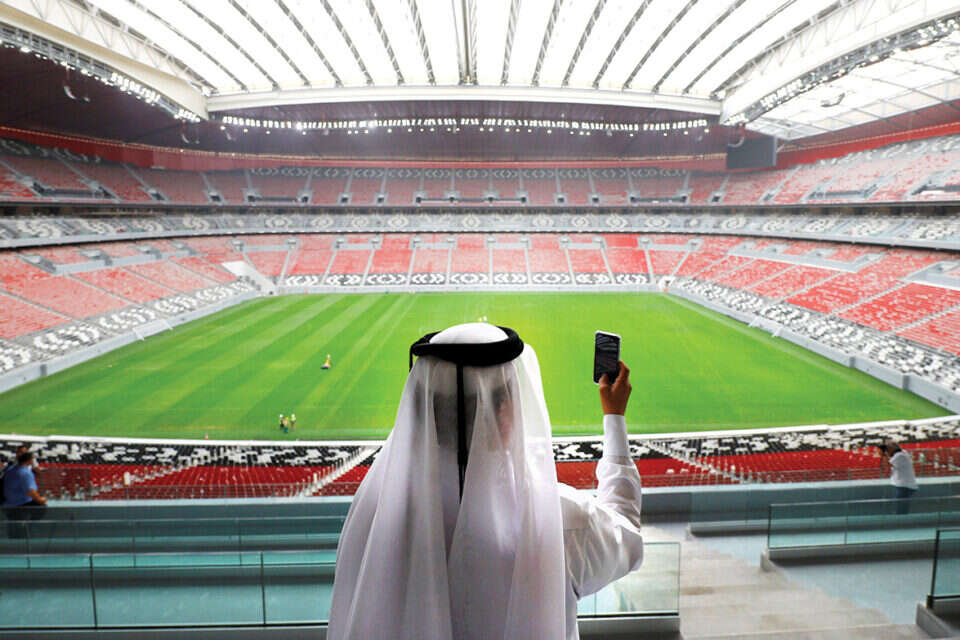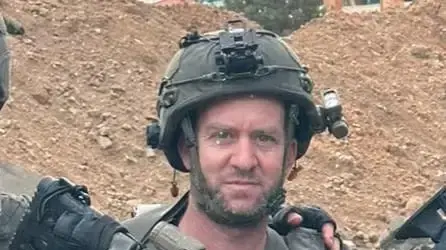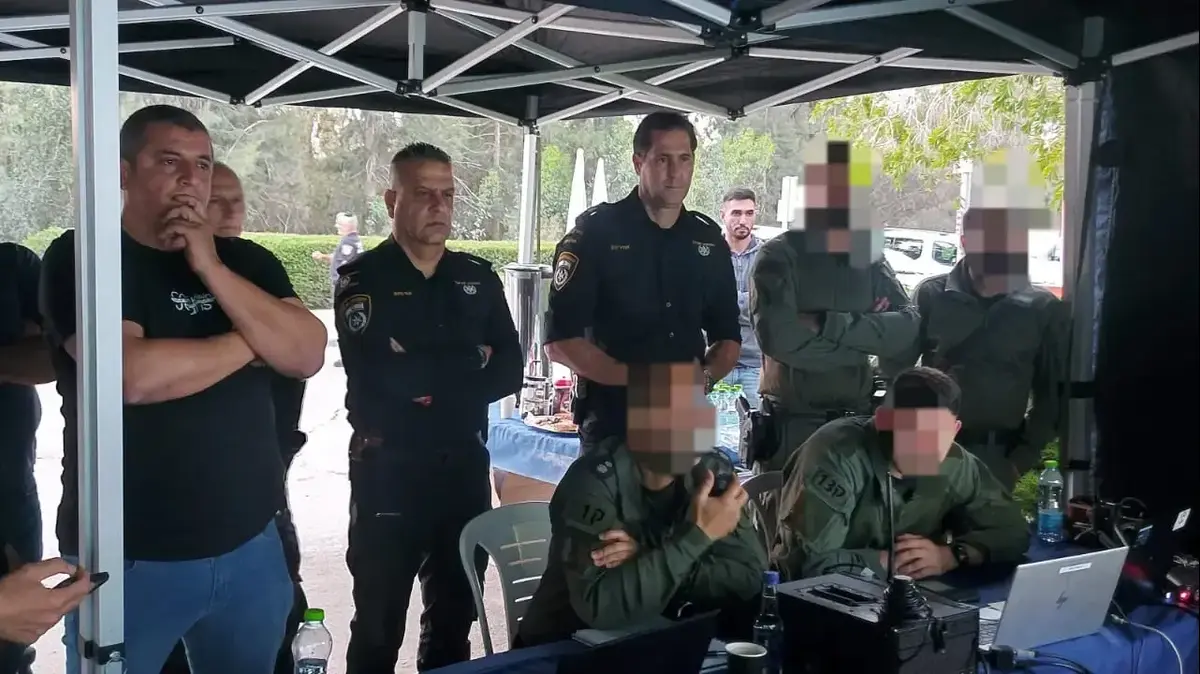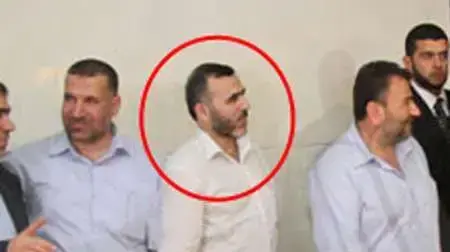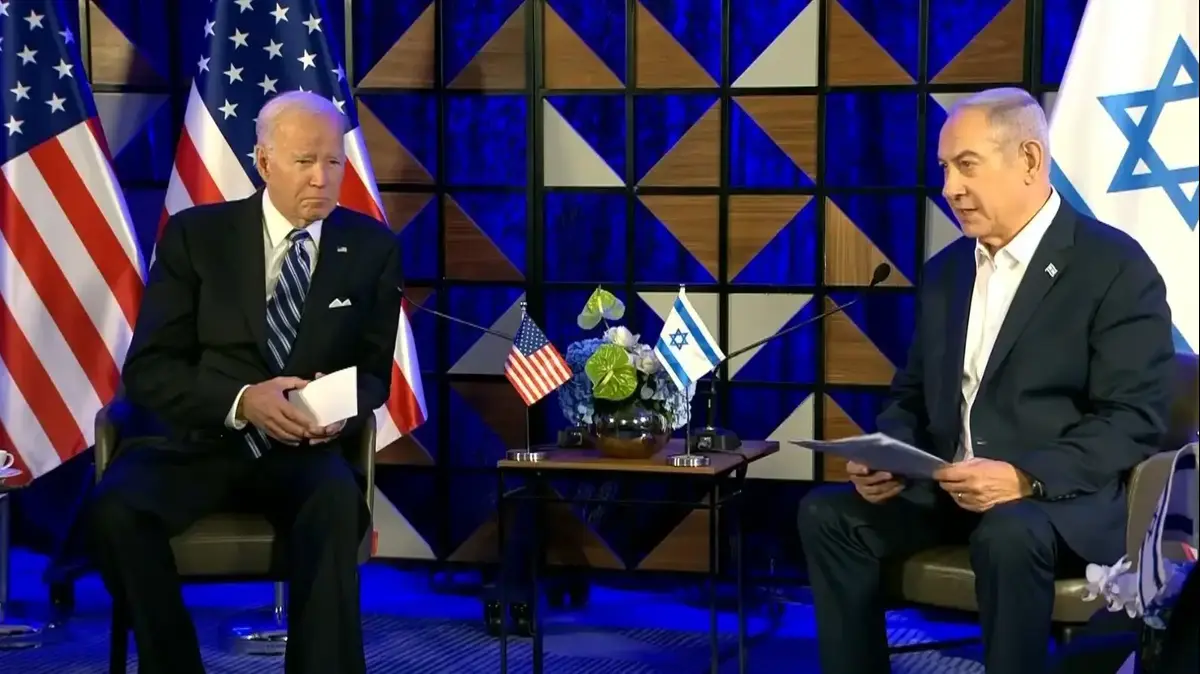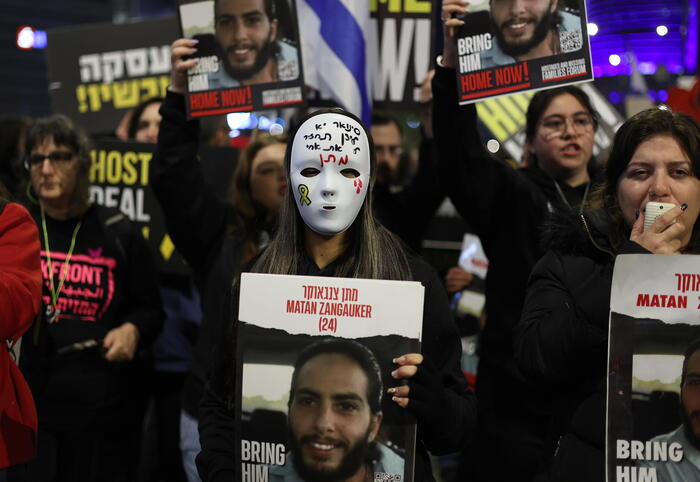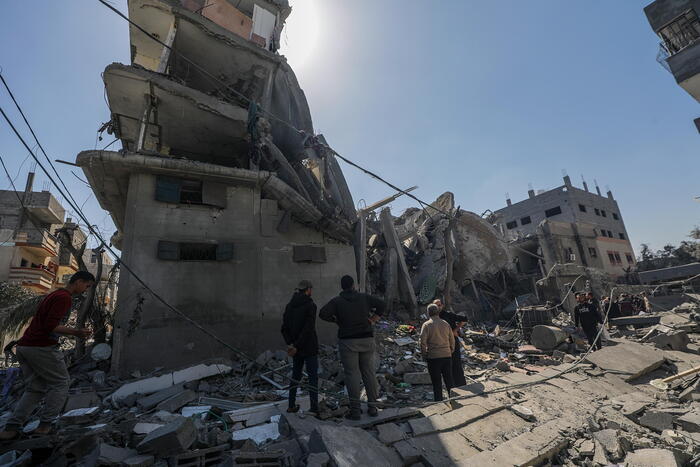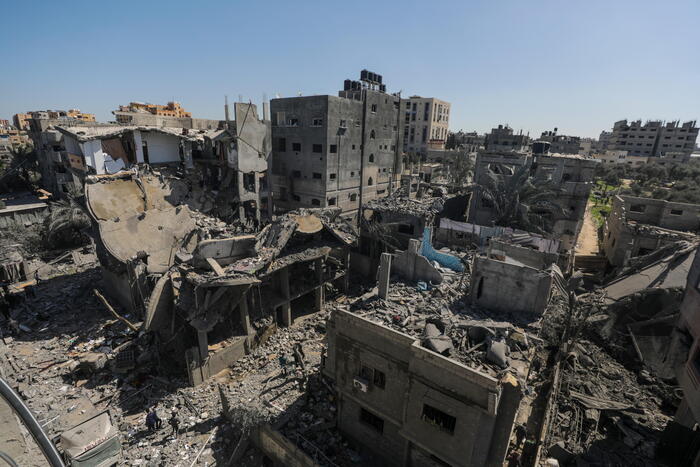Leaving the bar of the InterContinental Hotel, one of the favorite places of entertainment for senior Hamas figures, I heard Hebrew for the only time during my visit to Qatar.
Two businessmen waiting for a taxi and talking to each other quietly, and being a little embarrassed when an unexpected guest smiled at them.
It was a glimpse of secret sweeteners, but an open secret: Israel is present in Qatar far more than it seems.
Not only in the diplomatic and intelligence ties behind the scenes, but also in the economic ties.
In technology, in agriculture, in trade.
"Do not get too excited about it," a local source clarified.
"We work with everyone."
This strategy - "working with everyone" - probably explains the special status that Qatar has gained for itself in recent years.
On the one hand, it is a partner of Iran, Hamas and Turkey, and on the other hand, it maintains close ties with the West and with Israel.
Just this week, it was announced that the ruler of the country, Emir Tamim bin Hamad al-Thani, would leave for Tehran and then skip the European capitals, in an attempt to advance the signing of the renewed nuclear deal - further evidence of the power the Little Gulf is gaining.
This happened thanks to an impressive geopolitical navigation ability that began in the time of the Emir Sr., Sheikh Hamed, and continues with his son who succeeded him to power almost a decade ago.
On the way, although the boycott imposed on it by Saudi Arabia and the Emirates threatened to smash Qatar, it emerged stronger than ever.
Today, thanks to the sharp jump in oil and gas prices, Qatar can do almost anything it pleases, in any field.
And that's exactly what she does.
The locals are the landlords
Economic power - 7th in the world in GDP per capita - is only half the power that Qatar holds.
The second half is conscious.
Thanks to al-Jazeera, Qatar has become the leading public opinion maker in the Arab world.
The impact of the station is enormous, especially on the masses;
While the leadership in Doha runs, as mentioned, a complicated diplomacy of "working with everyone" - the station it funds lives in a much simpler world of good and bad.
Hamas supporters in Gaza, Photo: IP
Israel clearly belongs to the second group.
This week, for example, there were journalists on the network who tweeted in praise of the attack in Elad.
None of them are Qatari: just like in the other Gulf states, the locals in Qatar are homeowners as well.
The workers - in the supermarket, on the street or on television - are strangers.
Low-tech workers come, as always, from poor countries (mainly from India and Pakistan, and more recently from East Africa), and the more "considered" workers - from the West.
In the case of al-Jazeera, the journalists are mostly Lebanese, Egyptian and Syrian, who were not exactly educated on the knees of sympathy for Israel.
On Tuesday, al-Jazeera became a story in itself, after the network's correspondent in the area, Sheerin Abu Akla, was killed during an IDF operation in the Jenin refugee camp.
The IDF denies that it was shot by Palestinian militants in the camp, but in this case the Israeli version has no chance: an entire narrative has been built around Abu Akala, which serves the big story that al-Jazeera has been vigorously marketing for years, about the cruel and murderous Israel.
"This is not the government's policy, but he lives with it in peace," the local explains.
Thus, he can conduct himself comfortably in front of everyone;
On the one hand to host the exiled Taliban leadership during the years of American presence in Afghanistan, and on the other hand to allow the Americans (and the British, Germans and other countries) to rescue their citizens and thousands more Afghans by air train from Kabul to the American air base in Qatar.
This contribution to the Western withdrawal from Afghanistan has given Qatar a special status, known in Israel as "Majnona" - Major non Nato ally - a country that is not a member of NATO but holds a special status. Israel also has such a unique status. "Both and both": both to allow the U.S. UAV to take off from their territory to eliminate Qassem Suleimani, and also to arrive immediately afterwards in Tehran with suitcases of dollars to appease the authorities.
relations?
"It's not time yet"
Iran is currently the main barrier to significant progress in Israel-Qatar relations.
During the Saudi-emirate boycott, Iran was Qatar's only gateway to the world.
When its Gulf neighbors boycotted it air, sea, and land (Saudi Arabia even toyed for a moment with the idea of carving a canal to cut off Qatar from land), the Qataris could only fly or import through Iran.
Doha did not forget this to Tehran;
The fact that the two countries share a huge common economic interest - the largest gas field in the world - also tightens the connection between them, and removes the possibility that Qatar will openly connect to Israel.
Skipping journey.
Amir Qatar, Al-Thani, Photo: GettyImages
Naturally, Israel has a great interest in making the ties between the states visible, following the agreements of Abraham.
In the last two years, there have also been quite a few attempts to explore the Qataris, which have politely rejected them.
This week, too, officials in Doha said that "the time has not yet come" - a laundered expression that the issue is not currently on the table.
When will he be?
The top political-security leaders in Israel are convinced that this will happen (if it does) only after Saudi Arabia shifts its ties with Israel to the open.
In the past, Qatar has maintained open relations with Israel.
Both countries had ministries of economic interests, which were closed on a Qatari initiative during Operation Cast Lead in 2009.
Israel was then outraged at the Qatari leadership's close ties with Hamas in Gaza, and exceptionally applied its anger at the intelligence ties between the two countries as well.
Under the direction of the then head of the Mossad, Meir Dagan, Israel X is named after Qatar;
This boycott was lifted about two years later, and during the time of Dagan's successor, Tamir Pardo, the relationship flourished again - under the radar, of course.
No one at the top of Israel has not visited Qatar over the years, including the latter.
Only a few of these visits were published (for example, when Yossi Cohen arrived in Doha with the then General of the Southern Command, Herzli Halevi, in an attempt to bring calm to the Gaza Strip).
Had the full list of visitors been revealed, or the depth of ties between the countries, it would have been possible to understand the complex fabric of interests and connections in the region in general, and between the countries in particular.
When the emir reassured Sinwar
The special Israeli interest in Qatar stems from several reasons.
The main of which is its growing centrality in the world in general, and in the Gulf in particular.
The sheer wealth has made Qatar an influential player on every possible pitch.
This was the Emir-Abba's strategy: to invest a lot, and wisely, to become a major player.
The best example is of course the World Cup, which will take place this winter in Qatar, but there are hundreds more examples;
The Qatar Investment Authority (QIA) has invested hundreds of billions of dollars in real estate, banking, technology, energy, industry and many other channels over the past two decades. For businesses in Republican states in the U.S., to produce political influence over the administration.
The method worked, and the Trump administration played a role in removing the boycott over Qatar.
Qatari involvement in the Israeli-Palestinian conflict also has other causes.
Some of them are self-interested: the one who pushed Qatar to help Hamas was actually Israel, which saw Doha (and Qatari money) as a moderating and stabilizing factor.
The Qataris also had an interest in doing so in order to please the Americans, who as always value humanitarian aid to the poor wherever they are.
In any case, the amount transferred - about $ 30 million a month - is not even nuclei for Qatar;
For her, this is another investment that allows her an important position of influence.
During the escalation last month, the Qatari emir spoke on the phone with Abu Mazen and Yahya Sinwar, in an attempt to calm the winds.
Some claim that Israeli elements (who also operated in Cairo and Amman) were behind the talks.
This Israeli influence in Doha was also used to change the mechanism for transferring funds to the Gaza Strip;
If in the past the Qatari envoy to Gaza, Muhammad al-Amadi, would arrive in the Strip with suitcases of dollars in cash - today the transfer is made through UN vouchers to about 100,000 Gazan families a month (each family receives $ 100).
The purchase of diesel for the Gaza power plant is also funded by Qatari (about $ 10 million a month), through the United Nations, to prevent Hamas from stealing the money and using it for military intensification purposes.
Qatar has also set up a mechanism with Egypt to bring fuel into Gaza through Sinai.
This mechanism, too, was established on an Israeli initiative, and in an attempt to advance the civilian situation in Gaza - and implicitly to produce brakes against military escalation.
The Qataris are involved in a number of other humanitarian projects - from the construction of a hospital in the Rafah area, through the construction of residential neighborhoods, to the purchase of medicines and medical equipment such as prostheses for children and adults - and hold a permanent interest office under the name "Qatari Committee".
But this involvement also has ideological reasons: Qatar, just like Hamas, belongs to the Muslim Brotherhood.
It hosts on its territory the spiritual father of the movement, Sheikh Yusuf Kardawi, who has been considered for years the important spiritual authority in Islam and who is responsible for quite a few fatwas that have served as a pretext for murderous terrorist attacks.
Kardawi is one of Israel's most prominent and vocal opponents, and an open supporter of jihad and terrorism;
For years he owned a popular television program in Al Jazeera, and a research institute funded by the Qatari authorities.
Confidence is only one side in games.
Writers back in Qatar,
Hamas' foreign leadership is also based in Doha.
Officially, there is no sign of this: any attempt to locate the organization's offices in the city is in vain.
In the past, Khaled Mashaal, during his time as head of the organization's political bureau, used to operate from the luxury hotels in the city - the four seasons, Ritz Carlton and Intercontinental.
In recent years, he has been operating mainly from his villa, which is located in the prestigious al-Ra'in neighborhood in Doha.
He moves around with bodyguards, and divides his time between politics and business;
Some claim that the capital accumulated in recent years amounts to hundreds of millions of dollars.
It is easy to understand the top Hamas, who prefer to live in Doha rather than Gaza (Mashaal moved to Doha from Damascus).
Life in the capital of Qatar is pampering: hotels and luxury restaurants, spacious homes, private servants, access to the world, quality education for children and the opportunity to accumulate private wealth - great reasons to support the Palestinian struggle from afar.
Ismail Haniyeh and others from the top of the organization who were jealous of Mashaal, also manage most of their time today in Qatar.
There is also a pragmatic reason for this.
Senior Hamas figures know that in Qatar they are protected from Israeli attack.
Because of the sensitivity and importance of relations between the two countries, Israel will not dare to eliminate them on Qatar soil (probably after the lesson from the assassination of Mahmoud al-Mabhouh in Dubai).
This does not mean that Israel lives in peace with this activity;
When Salah Aruri - a senior Hamas official responsible for the organization's efforts to establish a terrorist infrastructure abroad - settled in Doha, Israel exerted enormous pressure until he was expelled from the country. Aruri moved to Turkey, where similar pressures are now exerted, The refugees in Tire and Sidon were responsible for launching the rockets to Israel last month.
The safest World Cup in history
The warm hospitality to Israel's rivals does not end with Hamas.
The sponsor of Doha is Azmi Bishara, a former Knesset member and founder of the Balad party, who fled Israel 15 years ago after being suspected of spying and aiding Hezbollah during the Second Lebanon War. And serves as Amir's personal adviser. He travels the world using a Qatari diplomatic passport, which grants him immunity.
As was revealed yesterday in "Israel Today", Bishara is now investing a huge effort in trying to torpedo the arrival of Israelis for the upcoming World Cup.
He is trying to take advantage of his close ties with the authorities to prevent Israelis from obtaining entry permits to Qatar, for fear that they will be a bridge to rapprochement between the two countries.
Not to be outdone, an Israeli source said this week that he believes the issue will be resolved because Qatar has pledged to the World Football Association to allow spectators from any country to enter its territory during the Games.
And yet, he admitted, this is a serious challenge, backed by factors of great power and interest, of which Bishara is the central one.
The World Cup will require Israel and Qatar to work closely together.
His part is security, against the background of the fear raised about terrorist attacks or kidnappings of Israelis during the games.
In Doha, this threat is eliminated altogether.
"These will be the safest games in history," a local source said.
There is quite a bit of logic in his words, because it is doubtful whether Iran or another factor will want to get involved with the whole world at the center of the important event in the world.
In any case, as mentioned, Qatar maintains good relations with all the elements and organizations in the region, and for the past decade it has acted as a mediator and financier in almost every event of the release of hostages abducted by ISIS and al-Qaeda or other extremists.
It can be assumed that such security cooperation between Israel and Qatar already exists, given the close relations between the security institutions of the two countries.
It is also likely that Israel will have an interest in sharing with the Qataris any intelligence information received, both to save lives and to gain points with the authorities in Doha.
In any case, this is also a clear Qatari interest;
After being accused of bribing half the world to win the hosting of the games, and having suffered immense criticism after thousands of workers were killed during the construction of the stadiums, Qatar has every interest in the games being successful and passing with complete confidence.
But security is only one side to the coordination required between the countries ahead of the World Cup.
Thousands of Israelis who have already purchased tickets for the games (estimates speak of 30,000-15,000) will require visas, accommodation arrangements, flights, communications, kosher food and more.
An Israeli source confirmed this week that behind the scenes, diplomatic contacts are already taking place between the countries, with the participation of various international bodies.
As always, it can be assumed that things will only close at the last minute, or as the local source put it: "The World Cup starts in November. There is still time until then."
The model: Israel
Qatar welcomes its visitors.
It is less flattering and pecking than the Emirates, and much less open than Bahrain.
The Qataris are more direct: "We mean business", a local source put it well.
In any case, Qatar is not steeped in attractions (except, perhaps, desert tours), and tourists rarely get to it in particular.
The Qataris hope that the World Cup will change that, and put them on the world tourism map as well.
For that to happen, Qatar will have to be less withdrawn - and it is doubtful whether it has such an interest.
After all, it is a religious country, where alcohol or pork is forbidden (drinking is only allowed in hotel bars; buying alcohol is only allowed for foreigners, and also only in a special shop located in a closed and secure compound, with a personal certificate obtained from the authorities), and most women walk around wearing veils;
Only on flights out of the country do they change into western jeans and a T-shirt - until they return home.
But Qatar is pragmatic, and wants to move forward.
It sees Israel as a role model: a small and fragile country, like itself, that has managed to become a regional power.
Not to be outdone, Israel in Doha is called a "miracle";
A country that, against all odds, manages to juggle and be strong and powerful.
Qatar also aspires to be such a significant force in the region, and beyond.
Despite the strong competition posed by its Gulf neighbors - mainly Saudi Arabia and the United Arab Emirates, but also by Bahrain, which competes with it for hosting US bases (Qatar is home to the Gulf's main US air base; Bahrain the naval base) - it manages to position itself as a factor to be reckoned with.
Thus, the Qatari emir was the first Arab ruler with whom Joe Biden met, after taking office as president.
Evidence of the success of the Qatari system can be found in its rival neighbors, Saudi Arabia and the Emirates.
They too, like Qatar, have recently adopted the "both" policy;
Also talk and do business with the West, but also communicate with those hostile to them, led by Iran.
It makes Israel less happy, but at least in the Qatari context it is worth seeing things as they are: at heart they are fully and whole with Hamas;
At the top, they understand that Israel is an asset - diplomatic, security, economic - and so they make sure to maintain good relations with it.
The IDF denies. Sheerin Abu Akala, Photo: Arab networks
Those who have acted against Qatar in recent years attest that it is fair.
"Tough and matter-of-fact negotiation wizard", as defined by one of the parties. This is the picture that also emerges from talks with local officials in Doha; , And have no interest in being harmed.
It can be assumed that Qatar will try to strengthen its position in the coming years, among other things while taking advantage of the world focus during the World Cup.
It faces many challenges along the way: regional rivalry with Saudi Arabia and the United Arab Emirates, the need to maneuver between Iran and the West and Israel, criticism of the sponsorship it gives to terrorists, and a long list of other political and economic issues.
On the other hand, it has exorbitant capital (which has increased dramatically in the past year against the background of the surge in oil and gas prices as a result of the war in Ukraine), and significant influence (a result of its well-informed policy and its ownership of al-Jazeera in Arabic and English).
In Doha, all of these are opportunities.
The way they have run their strategic affairs in recent years - and especially the way they have turned the boycott on them, which threatened to collapse them, into a powerful victory - requires them to be taken seriously.
This is evident, by the way, also in the way they made Doha, which was relatively backward in terms of infrastructure, the most advanced: under the auspices of the World Cup, motorways were paved and railway tracks laid, which greatly facilitated traffic in the city.
In this aspect, for those who come to the games, an experience is expected, because the proximity between the stadiums will make it possible to move around easily and see how many games a day.
Israel hopes that the World Cup will be another bridge to establishing relations between the two countries.
As mentioned, it is doubtful whether Qatar will have an interest in moving them to visible lines, and in any case - from talks in Doha (and Jerusalem) it was possible to learn this week that relations are stable and strong already, far beyond what the eye can see and the media can publish.
Were we wrong?
Fixed!
If you found an error in the article, we'll be happy for you to share it with us

